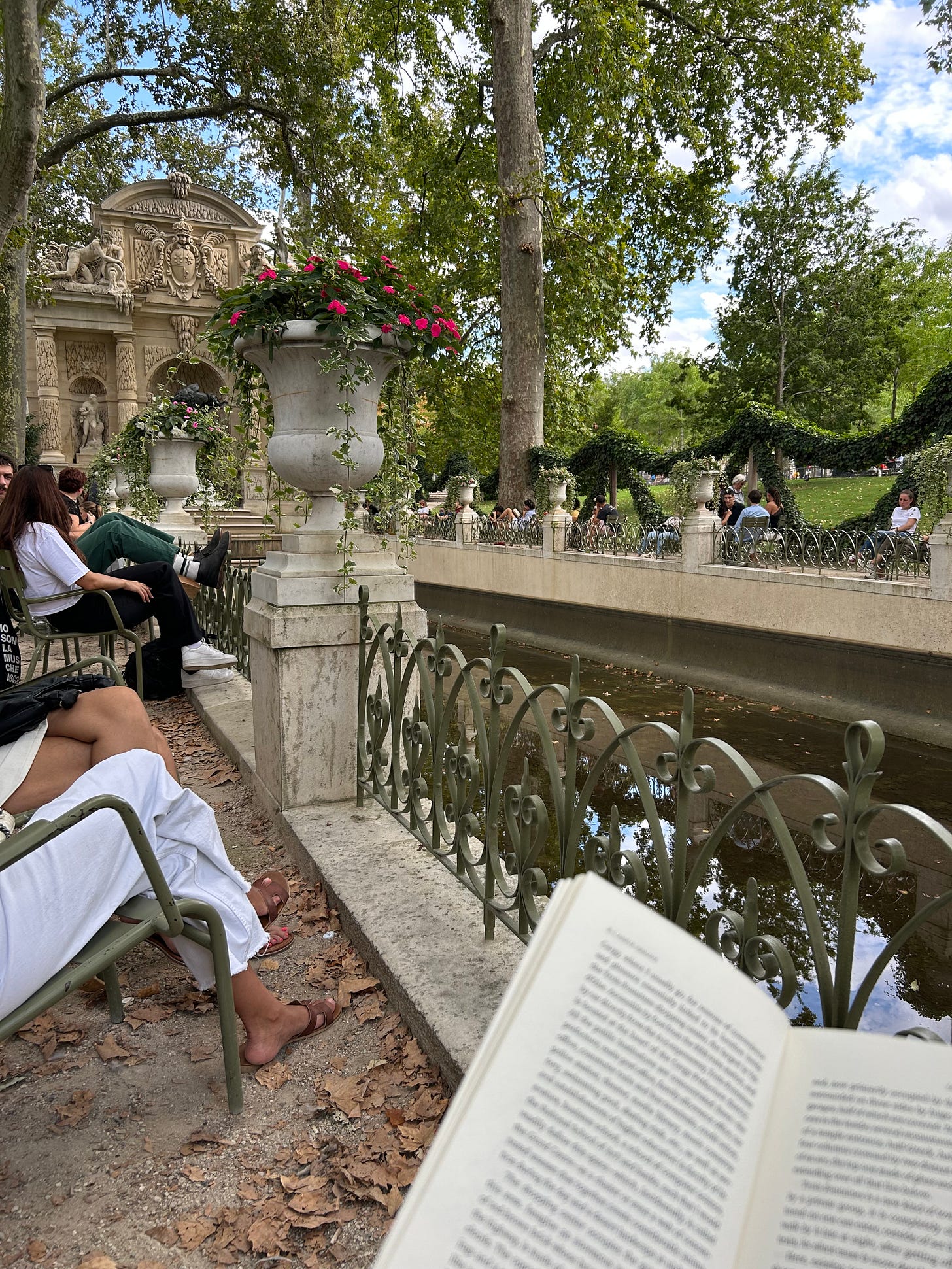Last weekend, on our final day in Paris, awaiting the night train to Nice, Deanna and I spent the afternoon roaming the Left Bank like nineteenth-century flâneurs. We enjoyed a leisurely pause at a cafe in the shadow of Saint Sulpice, then meandered into the Odéon for a late lunch. Without destination or plan, we made one key preparation: we each had a book in hand.
After days of rain, the sun emerged and the day was getting hot. So we strolled down to the Luxembourg Gardens for some shade and to spend some time reading. One of the ways the Luxembourg Gardens outshines Central Park, in my opinion, is that they offer not only a plethora of benches but an array of marvelously comfortable metal chairs in an iconic avocado green. These portable chairs can be rearranged for a congregation of friends, or pulled into the shade, or drawn alongside a fountain to rest weary feet. We scored two chairs in the shade of the Fontaine Médicis and pulled out our books.
At one point I emerge from absorption in my book to take in the delight of the scene. Parakeets squawk and scrap in the plane tree canopy overhead. The park is abuzz. But in this corner, both sides of the reflecting pool are lined with people reading. Nary a phone in sight; instead, others have come here with their books and newspapers to spend time with the printed page. I wonder if, like me, they’re also thinking how enchanted this is: to enjoy the art and beauty of the gardens, the din and hum of Paris, in the contemplative quiet of books that, at the same time, take us into some other world.
I have been thinking, lately, about the sheer pleasure of reading. I don’t mean the joys of what I can learn from reading, or the (be honest) frisson we enjoy from being “well read,” or even the transportive capacity of books. I mean how utterly delightful it can be to sit quietly and attend to imprinted marks on a page, holding this now ancient device of the codex in one’s hand. I mean the phenomenological experience of the sort of attention required to attend to these jots and tittles, and the way this act of bodily comportment can quiet the surrounding world. I mean the way an object you can hold in your hand offers a cocoon or cloister into which you can withdraw (and, sometimes, emerge transformed). As a man easily awed, I suppose I am also fascinated by the magic of how this form of material engagement —the body bent to hold the book, light illuminating the page, eyes scanning these marks, neurons processing the sensory input, and then the alchemy of how all of this generates a world of voices and personalities that are alive in my head.
On this particular afternoon, I am reading a little book (easily tucked into my day pack) by the French writer Annie Ernaux, the 2022 Nobel Prize winner. Look at the Lights, My Love is a year-long journal that attends to a phenomenon that, Ernaux notes, seems beneath literature: the big-box superstore, this invention of late capitalism that is now ubiquitous. (When you picture Paris, you don’t picture a Parisian Costco, but there it is.) The book is part scathing critique of what consumerism has wrought but also part love letter to this place where people from every walk of life rub shoulders. (Incidentally, reading this book finally convinced me to take seriously my publisher’s encouragement to work on a second edition of Desiring the Kingdom. While some have suggested the liturgical analysis of the mall has become dated, Ernaux’s book shows that all the same dynamics are at work in Wal-mart or the bougie “lifestyle centers” in gentrified neighborhoods of US cities. “These are the shelves of dreams and desires,” she says, “of hope.” For this and many reasons, I’m excited to work on a new edition, and probably a revised edition of You Are What You Love in tandem with this.)
Alongside me, Deanna was reading The Elegance of the Hedgehog by Muriel Barbery. Half of the story is told from the point of view of Renée, a frumpy concierge in a posh Paris apartment building. She is an autodidact who keeps her learning secret to confirm the stereotypes projected upon her by the tenants. But early in the novel she testifies to the way an encounter with books in school, thanks to a kind teacher, transformed the trajectory of her life and self-understanding. She realized that the hunger she’d experienced as a child could be satisfied by books:
I touched one for the first time. I’d seen the older children in class look into books for invisible traces, as if they were driven by the same force and, sinking deeper into silence, they were able to draw from the dead paper something that seemed alive. Unbeknownst to them all, I learned to read. When the teacher was still droning away with the letters of the alphabet to my classmates, I had already been long acquainted with the solidarity that weaves written signs together, the infinite combinations and marvelous sounds that had dubbed me a dame in this place, on that first day, when she [the teacher] had said my name. No one knew. I read as if deranged, at first in hiding and then, once it seemed to me that the normal amount of time to learn one’s letters had elapsed, out in the open for all to see, but I was careful to conceal the pleasure and interest that reading afforded me. The feeble child became a hungry soul.
Yes, that’s it: the hunger and pleasure, the joy and need. Reading as an act: sometimes of defiance, sometimes of escape. An action that looks like stillness. Reading as soul care.




